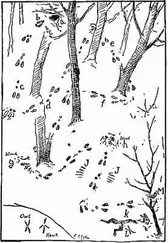Ernest Seton - Rolf in the Woods
Здесь есть возможность читать онлайн «Ernest Seton - Rolf in the Woods» весь текст электронной книги совершенно бесплатно (целиком полную версию без сокращений). В некоторых случаях можно слушать аудио, скачать через торрент в формате fb2 и присутствует краткое содержание. Год выпуска: 1997, Жанр: Приключения про индейцев, Исторические приключения, на английском языке. Описание произведения, (предисловие) а так же отзывы посетителей доступны на портале библиотеки ЛибКат.
- Название:Rolf in the Woods
- Автор:
- Жанр:
- Год:1997
- ISBN:нет данных
- Рейтинг книги:3 / 5. Голосов: 1
-
Избранное:Добавить в избранное
- Отзывы:
-
Ваша оценка:
- 60
- 1
- 2
- 3
- 4
- 5
Rolf in the Woods: краткое содержание, описание и аннотация
Предлагаем к чтению аннотацию, описание, краткое содержание или предисловие (зависит от того, что написал сам автор книги «Rolf in the Woods»). Если вы не нашли необходимую информацию о книге — напишите в комментариях, мы постараемся отыскать её.
Rolf in the Woods — читать онлайн бесплатно полную книгу (весь текст) целиком
Ниже представлен текст книги, разбитый по страницам. Система сохранения места последней прочитанной страницы, позволяет с удобством читать онлайн бесплатно книгу «Rolf in the Woods», без необходимости каждый раз заново искать на чём Вы остановились. Поставьте закладку, и сможете в любой момент перейти на страницу, на которой закончили чтение.
Интервал:
Закладка:
Now here a new danger presented itself. The zero wind would soon turn his clothes to boards. They stiffened in a few minutes, and the Indian knew that frozen hands and feet were all too easy in frozen clothes.
He made at once for the shore, and, seeking the heart of a spruce thicket, lost no time in building two roaring fires between which Rolf stood while the Indian made the bed, in which, as soon as he could be stripped, the lad was glad to hide. Warm tea and warm blankets made him warm, but it would take an hour or two to dry his clothes. There is nothing more damaging than drying them too quickly. Quonab made racks of poles and spent the next two hours in regulating the fire, watching the clothes, and working the moccasins.
It was midnight when they were ready and any question of going on at once was settled by Quonab. "Ogdensburg is under arms," he said. "It is not wise to approach by night."
At six in the morning they were once more going, stiff with travel, sore-footed, face-frozen, and chafed by delay; but, swift and keen, trotting and walking, they went. They passed several settlements, but avoided them. At seven-thirty they had a distant glimpse of Ogdensburg and heard the inspiring roll of drums, and a few minutes later from the top of a hill they had a complete view of the heroic little town to see—yes! plainly enough—that the British flag was flying from the flag pole.
Chapter 70.
Saving the Despatches
Oh, the sickening shock of it! Rolf did not know till now how tired he was, how eager to deliver the heartening message, and to relax a little from the strain. He felt weak through and through. There could be no doubt that a disaster had befallen his country's arms.
His first care was to get out of sight with his sled and those precious despatches.
Now what should he do? Nothing till he had fuller information. He sent Quonab back with the sled, instructing him to go to a certain place two miles off, there camp out of sight and wait.
Then he went in alone. Again and again he was stung by the thought, "If I had come sooner they might have held out."
A number of teams gathered at the largest of a group of houses on the bank suggested a tavern. He went in and found many men sitting down to breakfast. He had no need to ask questions. It was the talk of the table. Ogdensburg had been captured the day before. The story is well known. Colonel MacDonnell with his Glengarry Highlanders at Prescott went to drill daily on the ice of the St. Lawrence opposite Ogdensburg. Sometimes they marched past just out of range, sometimes they charged and wheeled before coming too near. The few Americans that held the place watched these harmless exercises and often cheered some clever manceuvre. They felt quite safe behind their fortification. By an unwritten agreement both parties refrained from firing random shots at each other. There was little to suggest enemies entrenched; indeed, many men in each party had friends in the other, and the British had several times trotted past within easy range, without provoking a shot.
On February 22d, the day when Rolf and Quonab struck the Oswegatchie, the British colonel directed his men as usual, swinging them ever nearer the American fort, and then, at the nearest point, executed a very pretty charge. The Americans watched it as it neared, but instead of wheeling at the brink the little army scrambled up with merry shouts, and before the garrison could realize that this was war, they were overpowered and Ogdensburg was taken.
The American commander was captured. Captain Forsyth, the second in command, had been off on a snowshoe trip, so had escaped. All the rest were prisoners, and what to do with the despatches or how to get official instructions was now a deep problem. "When you don't know a thing to do, don't do a thing," was one of Si Sylvanne's axioms; also, "In case of doubt lay low and say nothing." Rolf hung around the town all day waiting for light. About noon a tall, straight, alert man in a buffalo coat drove up with a cutter. He had a hasty meal in an inside room. Rolf sized him up for an American officer, but there was a possibility of his being a Canadian. Rolf tried in vain to get light on him but the inner door was kept closed; the landlord was evidently in the secret. When he came out he was again swaddled in the buffalo coat. Rolf brushed past him—here was something hard and long in the right pocket of the big coat.
The landlord, the guest, and the driver had a whispered conference. Rolf went as near as he dared, but got only a searching look. The driver spoke to another driver and Rolf heard the words "Black Lake." Yes, that was what he suspected. Black Lake was on the inland sleigh route to Alexandria Bay and Sackett's Harbour.
The driver, a fresh young fellow, was evidently interested in the landlord's daughter; the stranger was talking with the landlord. As soon as they had parted, Rolf went to the latter and remarked quietly: "The captain is in a hurry." The only reply was a cold look and: "Guess that's his business." So it was the captain. The driver's mitts were on the line back of the stove. Rolf shook them so that they fell in a dark corner. The driver missed his mitts, and glad of a chance went back in, leaving the officer alone. "Captain Forsyth," whispered Rolf, "don't go till I have talked with you. I'll meet you a mile down the road."
"Who are you and what do you want?" was the curt and hostile reply, evidently admitting the identification correct however.
Rolf opened his coat and showed his scout badge.
"Why not talk now if you have any news—come in side." So the two went to the inner room. "Who is this?" asked Rolf cautiously as the landlord came in.
"He's all right. This is Titus Flack, the landlord."
"How am I to know that?"
"Haven't you heard him called by name all day?" said the captain.
Flack smiled, went out and returned with his license to sell liquor, and his commission as a magistrate of New York State. The latter bore his own signature. He took a pen and reproduced it. Now the captain threw back his overcoat and stood in the full uniform of an army officer. He opened his satchel and took out a paper, but Rolf caught sight of another packet addressed to General Hampton. The small one was merely a map. "I think that packet in there is meant for me," remarked Rolf.
"We haven't seen your credentials yet," said the officer. "I have them two miles back there," and Rolf pointed to the woods.
"Let's go," said the captain and they arose. Kittering had a way of inspiring confidence, but in the short, silent ride of two miles the captain began to have his doubts. The scout badge might have been stolen; Canadians often pass for Americans, etc. At length they stopped the sleigh, and Rolf led into the woods. Before a hundred yards the officer said, "Stop," and Rolf stopped to find a pistol pointed at his head. "Now, young fellow, you've played it pretty slick, and I don't know yet what to make of it. But I know this; at the very first sign of treachery I'll blow your brains out anyway." It gave Rolf a jolt. This was the first time he had looked down a pistol barrel levelled at him. He used to think a pistol a little thing, an inch through and a foot long, but he found now it seemed as big as a flour barrel and long enough to reach eternity. He changed colour but quickly recovered, smiled, and said: "Don't worry; in five minutes you will know it's all right."
Very soon a sharp bark was heard in challenge, and the two stepped into camp to meet Quonab and little dog Skookum.
"Doesn't look much like a trap," thought the captain after he had cast his eyes about and made sure that no other person was in the camp; then aloud, "Now what have you to show me?"
"Excuse me, captain, but how am I to know you are Captain Forsyth? It is possible for a couple of spies to give all the proof you two gave me."
Читать дальшеИнтервал:
Закладка:
Похожие книги на «Rolf in the Woods»
Представляем Вашему вниманию похожие книги на «Rolf in the Woods» списком для выбора. Мы отобрали схожую по названию и смыслу литературу в надежде предоставить читателям больше вариантов отыскать новые, интересные, ещё непрочитанные произведения.
Обсуждение, отзывы о книге «Rolf in the Woods» и просто собственные мнения читателей. Оставьте ваши комментарии, напишите, что Вы думаете о произведении, его смысле или главных героях. Укажите что конкретно понравилось, а что нет, и почему Вы так считаете.




